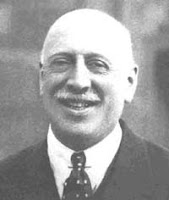 Today I am going to continue the discussion I had on Tuesday and Wednesday: my idea of an economic system, called Applied Monetary Management, that uses fiat money to create economic prosperity. If you have not read Tuesday or Wednesday’s posts, I strongly recommend doing so.
Today I am going to continue the discussion I had on Tuesday and Wednesday: my idea of an economic system, called Applied Monetary Management, that uses fiat money to create economic prosperity. If you have not read Tuesday or Wednesday’s posts, I strongly recommend doing so.I would like to respond (again) to the claim that AMM is socialistic/communistic and suffers because of it. As I have stated before, the national dividend is not enough to live off of, meaning that it will not cause anyone to work less. Also, the dividend does not have to be distributed equally—as I discussed previously, this is up to policy makers, who represent the will of the people. Also, after re-reading parts of C.H. Douglas’s book Social Credit, I noticed that even Douglas (pictured on right) suggests not giving the dividend to someone who has not worked in a long period of time. So, AMM is not communistic—like Social Credit, it is a “third way” between capitalism and socialism, incorporating aspects of both.
On a similar vein, an interesting thought occurred to me today: AMM can be used as a “bridge” to communism (or something like it), and because of the way AMM works the country implementing it would only reach communism if it was economically viable. As I explained on Wednesday, AMM distributes a national dividend to everyone to increase the public’s purchasing power. This dividend is not enough to live off of, so it is only a supplement to a person’s income. However, as technology increases the amount of labor required to create a product decreases—as we get closer an closer to the technological singularity, the amount of time it take to produce goods will decrease dramatically. When this happens, the result in an AMM society would be that the national dividend would increase sharply, as less people are working but there are more goods to consume. Eventually, society would reach a point where the only people who still worked are people who want to. At this point, incidentally, the national dividend would be enough to live off (think about it: no one else can be dissuaded from work by the dividend, meaning that it is enough for everyone else to live off of. Do the math if you don’t follow my logic.) The result is communism, or at least something like it. But unlike every other attempt at communism, which has failed because the society was not economically prepared, AMM only evolves into communism when the society and technology the society possesses is ready. I doubt this will ever happen—technology may never reach that point, and when it does society may not let the economy become a communistic one. But is an interesting thought.

Next, I would like to explain where AMM differs from Douglas’s Social Credit. Though the systems are similar, I have removed Douglas’s “Just Price” mechanism, which freezes prices, and replaced it with an optional government subsidy to lower prices. Also, AMM nationalizes trade, creates a powerful national bank, and places harsher restrictions on privately owned banks. (To those unfamiliar with the details of Social Credit, it might seem that AMM and Social Credit are exactly the same, and I wanted to correct this notion.)
This ends my five-day series of posts about economics and economic philosophy. However, this is certainly not the last you will hear about AMM or economic philosophy in general.

No comments:
Post a Comment